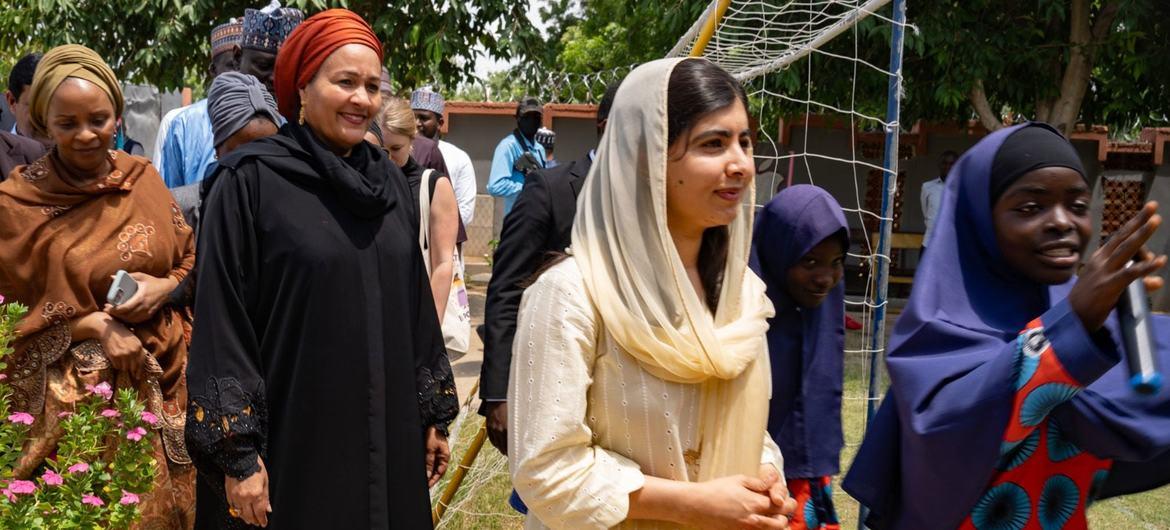More than 120 million girls are out of school and the world must do more to ensure they can get an education, Nobel laureate and UN Messenger of Peace Malala Yousafzai said in Abuja, Nigeria on Wednesday july 12, 2023, her 26th birthday.
The Pakistani education advocate – who was shot by the Taliban for her activism – was speaking exactly 10 years after her landmark ‘Malala Day’ address to youth at UN Headquarters in New York, where she called for global action against illiteracy, poverty and terrorism.
Passionate message
UN Deputy Secretary-General Amina Mohammed introduced Malala, saying she has transcended borders, cultures and generations, while her message and passion have touched people everywhere.
“Malala keeps daring us to imagine: to imagine a world with less intolerance, more understanding and respect. A world of less hate and more humanity. A world of less bigotry and more equality. A world of less ignorance, and more education and knowledge,” she said.
She added that both the UN and Malala know that quality education for both girls and boys “is not a dream, but it’s a fundamental human right.”

Focus on girls’ education
In the years since her UN speech, Malala has completed high school and university, travelled to more than 30 countries, and established an eponymous fund working to reduce barriers to girls’ education.
“I gave a lot of speeches and talked to many leaders,” she said. “In everything that I did, I tried to draw the world’s attention to girls like me – the nearly 120 million girls denied the right to education by poverty, patriarchy, climate and conflict.”
During that time, Malala also spent her birthday travelling to different countries to meet with local girls, including refugees in Jordan, Iraq, Kenya and Rwanda, and indigenous girls in Brazil.
She has made three trips to Nigeria alone, meeting with activists and young women, and also with parents whose daughters were among the 276 girls abducted in the Chibok school kidnapping in 2014.
Cheers and challenges
Malala shared the stories of some of the young women she has met over the years who have gone on to earn university degrees and even start working.
“We should celebrate the girl who goes to university, takes a job, chooses when and if she marries. But we should not deceive ourselves into thinking that we have made enough progress,” she warned.
“I want to cheer for those who have made it, despite the challenges they faced. But my heart aches for those who we failed. Every young woman like me has friends we saw being left behind – those whose governments, communities and families held them back.”
Little has changed
She praised global initiatives to boost education and gender equality, which will help to achieve the Sustainable Development Goal (SDG) of quality education for all by 2030. Yet she again stressed that “this handful of victories can’t hide how little has changed for hundreds of millions of girls”, including due to the fallout from the COVID-19 pandemic.
Malala also highlighted the situation in Afghanistan following the Taliban’s return to power two years ago. Previously, one in three women there were enrolled in university, she said, but today it is the only country in the world where women and girls are banned from pursuing an education.
“Even as a teenager, I understood that progress could be slow,” she said. “But I never expected to witness a complete reversal. An entire country of girls locked out of school, trapped in their homes, and losing hope.”

Be the change
In her powerful speech at the UN in 2013, the 16-year-old Malala famously declared that “one child, one teacher, one pen and one book can change the world.” Her youthful optimism has since been tempered.
“I will tell you today what I did not know then. One child, even with the best resources and encouragement, one child can’t change the world. Neither can one president or prime minister,” she said.
“One teacher, one activist, one parent – no one can change the world on their own. What is true is that change can begin with just one person.”

Invest in girls
Malala called for joining forces to build a world where all children have access to 12 years of quality education, while leaders must be held accountable for their commitments to gender equality and education.
She also underlined the importance of communities. “I believe that so many of the problems girls face would be solved if we could break the stranglehold of patriarchy, the misogyny, we disguise as cultural tradition or religion,” she said.
Malala revealed that when she was 16, she could not have imaged what the decade ahead would hold, although she was hopeful.
“Today, I can see the future more clearly because I have met our future leaders. Girls understand the power of education and they’re working to open the school gates wide enough for every child to enter,” she said.
“I know that if we match their determination, fund their work and follow their lead, we will see so much progress in the next 10 years.”
School visits
As part of her visit, on Tuesday, the Deputy Secretary-General travelled to Maiduguri, the capital of Borno State, with Malala and her father, Ziauddin Yousafzai who is a co-founder of the Malala Fund.
The delegation visited three schools all of which focus on providing quality education to girls, many of whom have been impacted by violence.
Ms. Mohammed is headed next to the Belgian capital Brussels, where she will join the Secretary-General in UN-European Union meetings.
Source:news.un.org


